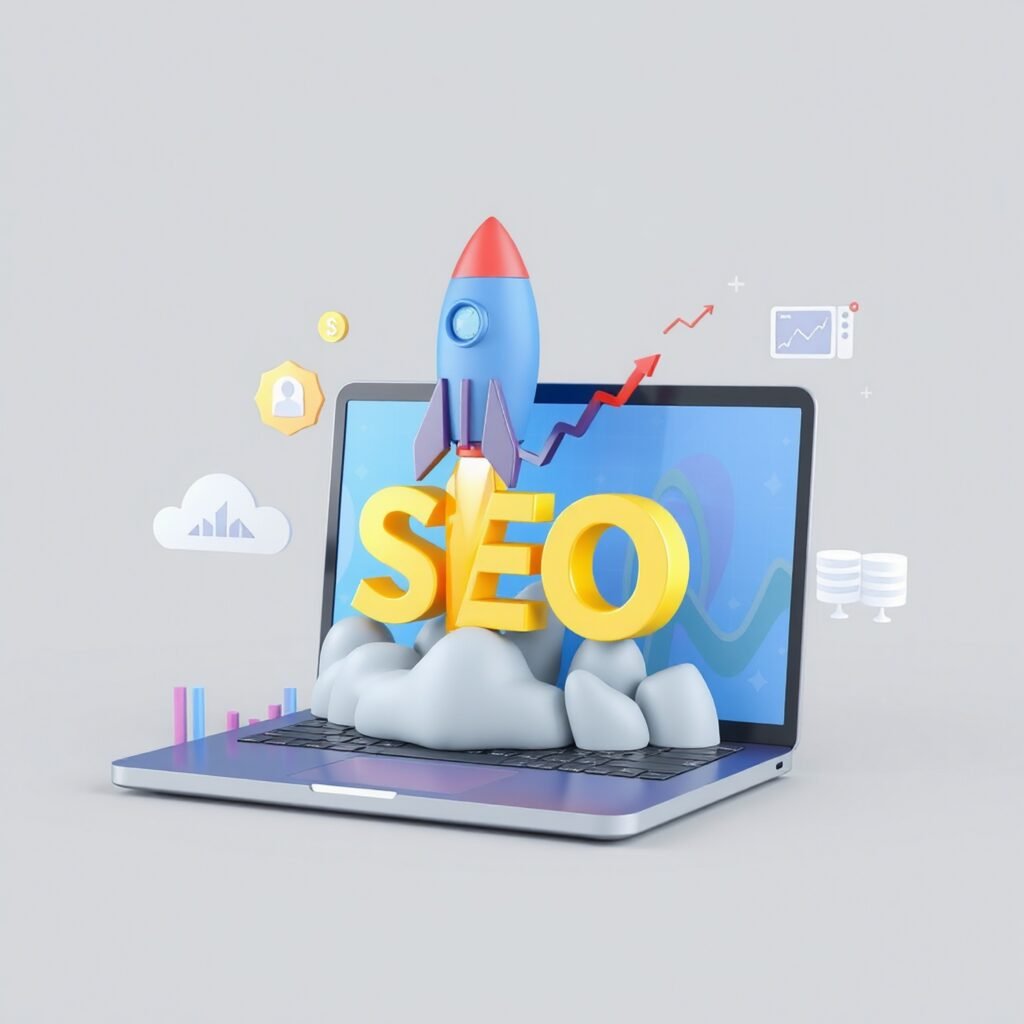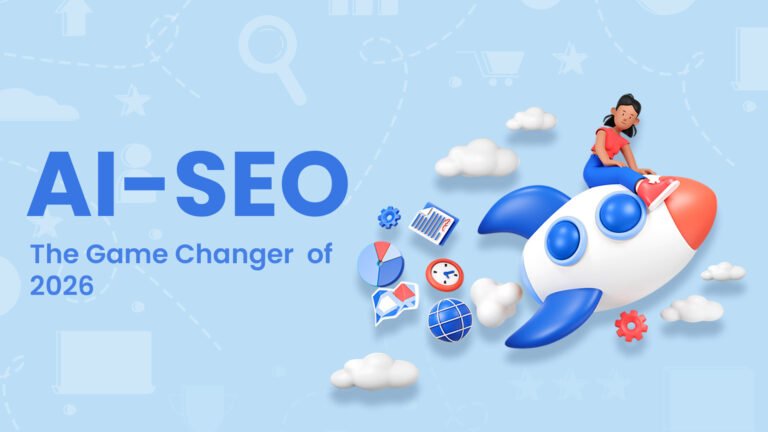Introduction: The New Era of AI-SEO
AI-SEO isn’t just another buzzword anymore—it’s completely reshaping how businesses get discovered online in 2026. If you’re still optimizing your content the old-fashioned way, you’re already behind. The landscape of search engine optimization has undergone a massive transformation, and artificial intelligence is at the heart of this revolution.
Gone are the days when stuffing keywords into your content and building a few backlinks would guarentee top rankings. Today’s AI-SEO landscape demands a more sophisticated approach that combines machine learning insights, user intent understanding, and authentic human expertise.
In this comprehensive guide, we’ll explore how AI-SEO is changing everything about digital marketing in 2026, and more importantly, what you need to do to stay ahead of the curve.

What Exactly Is AI-SEO and Why Does It Matter?
AI-SEO refers to the integration of artificial intelligence technologies into search engine optimization strategies. It’s not just about using AI tools to write content faster—it’s about understanding how AI-powered search engines like Google’s AI Overviews, ChatGPT, and other large language models are fundamentally changing how people discover information online.
The reality is that platforms like ChatGPT, Google AI Overview, and other large language models are no longer just tools—they are competitors for attention. When someone asks a question, these AI systems generate comprehensive answers by synthesizing multiple sources, which means traditional website clicks are declining rapidly.
A notable 77% of SEO professionals worry that AI answers will reduce website clicks, and this concern is justified. However, this shift also creates enormous oportunities for businesses that adapt their AI-SEO strategies correctly.
The Evolution of Search: From Keywords to Intent
Understanding AI-Powered Search Intent
Traditional SEO was straightforward—identify keywords, optimize your pages, build links, and watch your rankings climb. But search engines no longer rely solely on keyword matching. They now use natural language processing (NLP) and machine learning to understand intent — what the user actually means, not just what they type.
This means your AI-SEO strategy in 2026 must focus on answering questions comprehensively rather than just including keywords a certain number of times. The algorithms have become incredibly sophisticated at understanding context, user behavior patterns, and the genuine value your content provides.

The Death of Keyword Density (Sort Of)
Here’s something many marketers struggle to accept: keyword density as a primary ranking factor is essentially dead. That doesn’t mean keywords don’t matter—they absolutely do for AI-SEO—but the way you use them has evolved dramatically.
Instead of repeating “AI-SEO” ten times in a 500-word article, focus on creating comprehensive content that naturally incorporates your focus keyword and related semantic terms. Modern AI-SEO requires you to think about topical authority and semantic relevance rather than mechanical keyword insertion.
Generative Engine Optimization (GEO): The New Frontier
One of the biggest developments in AI-SEO for 2026 is the emergence of Generative Engine Optimization (GEO). GEO is a forward-looking approach focused on optimizing content for AI-driven search engines, and it’s fundamentally different from traditional SEO.
What Makes GEO Different?
GEO emphasizes structuring your content so AI systems can easily interpret, extract, and cite it. This means:
- Clear hierarchical structure with descriptive headings that outline your content logically
- FAQ sections that directly answer common questions in concise formats
- Structured data markup that helps AI understand your content’s context and relationships
- Citation-worthy content that AI systems feel confident referencing
The goal of AI-SEO through GEO isn’t necessarily to rank first anymore—it’s to become the authoritative source that AI systems cite when generating answers. Think less about ranking first, and more about being the source behind the AI summary.
E-E-A-T: Why Human Expertise Beats AI-Generated Content
Experience, Expertise, Authoritativeness, and Trust
If there’s one framework you need to understand for AI-SEO in 2026, it’s E-E-A-T. Google has expanded its quality evaluation criteria to include “Experience” alongside Expertise, Authoritativeness, and Trust, signaling that firsthand knowledge matters more than ever.
This is actually great news for human content creators. While AI can generate readable text quickly, it still lacks one thing: experience. Real-world examples, personal insights, case studies from actual work—these elements make your AI-SEO content valuable and impossible for pure AI to replicate.
How to Demonstrate E-E-A-T in Your Content
To succeed with AI-SEO in 2026, you need to clearly demonstrate your expertise:
- Author bios that establish credentials and experience
- Case studies from real projects or clients
- Original research and data that can’t be found elsewhere
- Detailed examples that show practical application of concepts
- Citations and sources that demonstrate thoroughness
- Regular content updates showing ongoing engagement with your topic
Remember, AI-SEO isn’t about tricking algorithms—it’s about proving to both AI systems and human readers that you’re a legitimate authority worth listening to.

The Technical Foundation of AI-SEO Success
Page Experience Signals Matter More Than Ever
You can have the best content in the world, but if your website is slow, unresponsive, or difficult to navigate, your AI-SEO efforts will suffer. The technical foundation of your website—loading speed, interactivity, and visual stability—directly impacts both user satisfaction and search performance.
Core Web Vitals aren’t going away in 2026—they’re becoming more critical. Ensure your site loads in under three seconds, is mobile-responsive, and provides a smooth user experiance across all devices.
Structured Data: The Secret Weapon of AI-SEO
If you’re serious about AI-SEO, implementing structured data (schema markup) is non-negotiable. Structured data helps AI systems understand your content’s context, relationships, and meaning beyond just the visible text.
Key schema types for AI-SEO in 2026:
- Article schema for blog posts and guides
- FAQ schema for question-answer content
- How-to schema for instructional content
- Product schema for ecommerce
- Local business schema for location-based businesses
- Review schema for building trust signals
Content Strategy for the AI-SEO Era
Original Content Creation Still Wins
Despite all the changes, one thing remains constant: original content creation topped the list at 66% when SEO professionals were asked what had the most positive impact. While AI tools can assist with ideation and outlining, your published content must offer unique insights that only human experience can provide.
The most successful AI-SEO strategies in 2026 combine AI efficiency with human creativity. Use AI tools to:
- Research trending topics and questions
- Identify content gaps in your industry
- Generate outlines and structure
- Analyze competitor content
- Suggest related keywords and topics
But always have humans add the context, examples, personality, and expertise that make content genuinely valuable.
The Power of Content Updates
Creating new content is important, but content updates came second at 42.6% in terms of positive impact. In the AI-SEO landscape of 2026, regularly updating your existing content is crucial.
Fresh statistics, new case studies, updated screenshots, additional sections addressing emerging questions—these updates signal to both search engines and AI systems that your content remains relevant and authoritative.
Voice and Visual Search Optimization
Conversational Content for Voice Search
Traditional keyword-based searches are morphing into full-blown conversations in ChatGPT and Perplexity. This means your AI-SEO strategy must account for how people actually speak, not just how they type.
Optimize for voice search by:
- Using natural, conversational language
- Targeting long-tail, question-based keywords
- Creating comprehensive FAQ sections
- Structuring content to answer specific questions directly
- Including location-based keywords for local searches
Visual Search and AI-SEO
Visual tools like Google Lens are allowing users to search by image, which creates new AI-SEO opportunities. Ensure all images on your site have:
- Descriptive file names (not “IMG_1234.jpg”)
- Comprehensive alt text that describes the image naturally
- Appropriate context around images in your content
- Proper image compression for fast loading
- Captions when relevant
AI Tools and Technologies Shaping SEO in 2026
The Current AI-SEO Tool Landscape
AI writing assistants have jumped to fourth place at 42.3% in terms of tool usage among SEO professionals. However, the key is using these tools strategically rather than relying on them completely.
Popular AI-SEO tools in 2026 include:
- Content optimization platforms that analyze semantic relevance and topical authority
- AI research assistants that help identify content opportunities
- Technical SEO tools powered by machine learning for site audits
- Rank tracking platforms that account for AI Overview appearances
- Competitor analysis tools that use AI to identify strategy gaps
The most effective AI-SEO practitioners don’t just adopt tools—they integrate them into a cohesive strategy that maintains human oversight and creativity.
Also Read : Tanka AI
Answer Engine Optimization (AEO): Getting Featured
Optimizing for AI-Generated Answers
Answer Engine Optimization (AEO) is a critical component of modern AI-SEO. The goal is to structure your content so it’s selected by AI systems when generating direct answers to user queries.
Best practices for AEO include:
- Direct, concise answers near the beginning of your content
- Clear section headers that match common questions
- Bullet points and lists that AI can easily extract
- Definition boxes for key terms and concepts
- Step-by-step instructions for how-to queries
- Comparison tables for versus queries
Your AI-SEO strategy should aim to be the definitive resource that AI systems want to cite and reference.
Local AI-SEO: Dominating Your Geographic Market
The Importance of Local Signals
For businesses serving specific geographic areas, local AI-SEO has become incredibly important. Personalization strategies grounded in first-party data will become essential for SEO and marketing success as privacy regulations continue tightening.
Local AI-SEO tactics for 2026:
- Google Business Profile optimization with complete, accurate information
- Local content creation addressing community-specific needs
- Local schema markup for NAP (Name, Address, Phone) consistency
- Location pages for multi-location businesses
- Local link building from community organizations and businesses
- Customer reviews that mention specific locations and services
AI systems increasingly prioritize businesses with strong local signals and authentic community connections.
Video Content and AI-SEO
Why Video Matters in 2026
Video content has become essential for comprehensive AI-SEO strategies. Use video SEO: titles, captions, and local keywords. Create short videos answering FAQs or showcasing services.
Optimize videos for AI-SEO by:
- Creating transcripts that search engines can index
- Using descriptive titles with relevant keywords
- Adding comprehensive descriptions with timestamps
- Including captions and subtitles
- Embedding videos in relevant written content
- Creating video schema markup
- Uploading to multiple platforms (YouTube, your website, social media)
Video content helps establish expertise and provides alternative content formats that AI systems can understand and reference.
The Role of User-Generated Content in AI-SEO
Social Proof and Trust Signals
Search engines are no longer the only discovery channel. TikTok, Reddit, YouTube Shorts, LinkedIn, and other social ecosystems drive visibility and Google pulls signals from them.
User-generated content serves multiple AI-SEO purposes:
- Reviews and testimonials build trust and provide authentic perspectives
- Comments and discussions show engagement and community
- Social media mentions extend your brand’s reach
- Q&A contributions on platforms like Quora and Reddit establish authority
- Forum participation demonstrates expertise in action
Encouraging and managing user-generated content should be part of your broader AI-SEO strategy.
First-Party Data and Privacy-Focused AI-SEO
Adapting to a Cookieless Future
As third-party cookies fade and privacy regulations tighten, personalization strategies grounded in first-party data will become essential. This affects how you collect information about your audience and personalize their experence.
Build first-party data through:
- Email subscriptions with value-driven content offers
- Loyalty programs that reward engagement
- Account creation with clear benefits
- Surveys and feedback forms that provide insights
- Transparent data practices that build trust
AI-SEO in 2026 requires balancing personalization with privacy, using data ethically to create better user experiences.
You can visit: Kinetools
Common AI-SEO Mistakes to Avoid
Pitfalls That Will Hurt Your Rankings
Even with the best intentions, many businesses make critical AI-SEO mistakes:
1. Pure AI-generated content without human editing – AI can assist, but can’t replace human expertise and originality
2. Ignoring technical SEO fundamentals – No amount of great content can overcome slow page speeds and broken technical elements
3. Focusing solely on Google – Success will come to those optimizing for multiple layers by structuring content to serve conversational queries, producing formats that AI can cite
4. Neglecting content updates – Fresh content matters, but so does maintaining and improving existing content
5. Overlooking E-E-A-T signals – Without demonstrating expertise and experience, your content won’t be trusted by AI systems
6. Keyword stuffing – This never worked well, and AI-powered algorithms are even better at identifying and penalizing it
7. Ignoring mobile experience – Mobile-first indexing isn’t new, but it’s more critical than ever
Measuring AI-SEO Success in 2026
New Metrics for a New Era
Traditional metrics like rankings and click-through rates are still relevant, but AI-SEO success requires additional measurements:
- AI citation frequency – How often are AI systems citing your content?
- Featured snippet appearances – Are you showing up in position zero?
- Voice search rankings – How do you rank for conversational queries?
- Engagement metrics – Time on page, scroll depth, interaction rates
- Conversion rates – Ultimately, does your traffic convert?
- Brand search volume – Are people specifically searching for your brand?
- Domain authority growth – Is your overall site authority increasing?
Traditional KPIs like click-thru rate, pageviews, etc. will fade out as engagement-focused and visibility-focused KPIs become front-and-center success measurements.
Building an AI-SEO Strategy That Works
Practical Steps to Get Started
Implementing effective AI-SEO doesn’t happen overnight, but you can start making progress immediately:
Phase 1: Foundation (Weeks 1-4)
- Conduct comprehensive technical SEO audit
- Implement core structured data markup
- Optimize page speed and Core Web Vitals
- Ensure mobile responsiveness
Phase 2: Content Optimization (Weeks 5-12)
- Audit existing content for E-E-A-T signals
- Add author bios and credentials
- Update top-performing content with fresh information
- Create FAQ sections addressing common queries
- Implement conversational headers
Phase 3: AI-Ready Optimization (Weeks 13-24)
- Develop GEO-focused content pieces
- Create video content with transcripts
- Build comprehensive topic clusters
- Expand into voice search optimization
- Establish presence on alternative platforms
Phase 4: Ongoing Optimization
- Regular content updates and refreshes
- Continuous technical monitoring
- A/B testing different AI-SEO approaches
- Tracking AI citation and visibility
- Adapting to algorithm changes
The Human Element: Why AI Can’t Replace Real Expertise
The Irreplaceable Value of Human Experience
Here’s the truth about AI-SEO in 2026: technology is powerful, but human expertise is irreplaceable. AI tools can analyze millions of data points, suggest optimizations, and even draft content—but they can’t replicate genuine experience, creative insight, or empathetic understanding of audience needs.
Human-first content will reign supreme as marketers, audiences flock to AI platforms and processes. The businesses winning in AI-SEO are those that use technology to enhance human creativity rather than replace it.
Your personal stories, case studies from real projects, lessons learned from failures, insights from years of experience—these elements make your content valuable in ways that pure AI content never can be.
Industry-Specific AI-SEO Considerations
Tailoring Your Approach
Different industries face unique AI-SEO challenges and opportunities:
E-commerce: Focus on product schema, user reviews, detailed specifications, and visual search optimization
Local services: Prioritize Google Business Profile, local content, customer testimonials, and service area pages
B2B SaaS: Emphasize thought leadership, detailed guides, case studies, and industry research
Healthcare: Ensure YMYL (Your Money Your Life) compliance, medical professional credentials, and citation of reputable sources
Finance: Focus on expertise demonstration, regulatory compliance, and conservative, fact-based content
News and media: Prioritize timeliness, author credentials, original reporting, and breaking news optimization
Adapt your AI-SEO strategy to your specific industry’s requirements and audience expectations.
The Future Beyond 2026: What’s Next for AI-SEO
Emerging Trends to Watch
While we’re focused on 2026, it’s worth considering what’s coming next:
Autonomous AI agents – Autonomous AI agents, or bot systems capable of completing tasks without direct human input, become mainstream in search and decision workflows
Multimodal search – Combining text, voice, image, and video search in unified experiences
Hyper-personalization – Even more tailored search results based on individual behavior and preferences
Augmented reality search – Searching for information overlaid on the real world
Blockchain verification – Using blockchain to verify content authenticity and authorship
The AI-SEO landscape will continue evolving rapidly, requiring constant learning and adaptation.
Conclusion: Embracing the AI-SEO Revolution
AI-SEO isn’t replacing traditional search engine optimization—it’s evolving it into something more sophisticated, user-focused, and results-driven. The businesses that succeed in 2026 and beyond will be those that embrace these changes while maintaining the human elements that make content truly valuable.
Yes, you need to understand how AI systems work. Yes, you need to implement structured data and optimize for generative engines. Yes, you need to stay current with emerging trends and technologies.
But most importantly, you need to create genuinely helpful content that serves your audience’s needs with expertise, experience, and authenticity that only humans can provide.
The AI-SEO revolution isn’t something to fear—it’s an opportunity to elevate your digital marketing strategy, reach more qualified audiences, and establish your business as the go-to authority in your industry.
Start implementing these AI-SEO strategies today, stay committed to continuous improvement, and watch your organic visibility grow in ways that were impossible just a few years ago.
The future of search is here, and it’s powered by the perfect combination of artificial intelligence and human expertise. Are you ready to dominate it?
Subscribe for Newsletter

